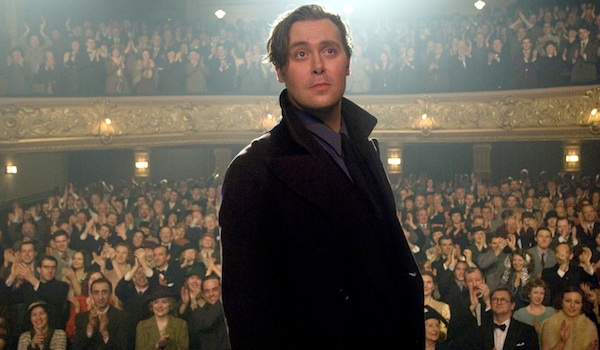Me and Orson Welles Review
With the exception of one outstanding performance, Me and Orson Welles is completely disposable. An awkward mix of romantic comedy, theater drama, and coming-of-age story, the film isn’t original and doesn’t say anything particularly interesting. But Christian McKay’s brilliant work as the enormously charming, yet painfully controlling Welles is on par with some of the best performances of 2009. Still, one performance can only carry a film so far, and without much else to hang its hat on, Me and Orson Welles ends up being very slight and forgettable.
Welles isn’t actually the film’s main character. Instead, it’s Richard (Zac Efron), the “Me†of the film’s title. Richard is a high-school student in 1930s New York. He’s a dreamer and longs for nothing more than to be in the middle of the film, theater, radio, art, music, and literature worlds. Unfortunately, while Richard thinks himself to be a jack of all trades, he’s a master of none. But something about him catches the eye of theater legend Orson Welles (McKay), and he offers Richard a part in his famous Mercury Theater’s production of Julius Caesar. While Richard practices, some of the theater’s other players—Joseph Cotton (James Tupper) and George Coulouris (Ben Chaplin)—show him the ropes, and he starts developing feelings for Sonja (Claire Danes), the theater’s secretary. Everything is wonderful, until he starts to see the real Welles—a controlling, demanding, sneaky, and sometimes cruel man who isn’t afraid to ruin a career or two for his art.
Part of the problem with Me and Orson Welles is that it’s a number of different (half-baked) films all rolled up into one. And they’re films we’ve seen a hundred times before—the coming-of-age story, the mean boss story, the impossible love story, etc. Because all of these different stories are going on at once, the film’s tone is inconsistent. It transitions from slapstick to serious very suddenly, preventing us from connecting with any of these stories on an emotional or intellectual level.
That being said, history is on director Richard Linklater’s side here. While he doesn’t make the most out of this opportunity, the setting—Welles’ famous theater—is inherently interesting. After Julius Caesar’s wildly successful opening night, Welles remarks, “How am I going to top this?†The line is brilliant and sums up just why Me and Orson Welles isn’t a bad film. Welles is such an iconic figure, it’s fascinating to see where he began and whether the stories about how difficult he was are true. And McKay’s performance brings that all home.
Unfortunately, the film was too small, and McKay too unknown, for this performance to be remembered during Oscar season, but it’s the Academy’s loss. This is a masterful performance. McKay completely inhabits the role and shows us why people loved Welles, and why they hated him.
The rest of the primary actors aren’t quite as successful. While the character of Welles might think Richard has the qualities of a natural-born actor, I don’t think he’d say the same thing about the man playing Richard. Zac Efron is just there. He doesn’t emote very much, and when he tries, it’s almost comical. I wouldn’t say this is a bad performance (it certainly could have been worse), but it’s definitely not good. Claire Danes, on the other hand, is a fine actress, but her role is seriously underwritten. She’s supposed to be the one who helps Richard grow up, but it seemed to me that she needed to grow up a little herself.
Ultimately, I don’t think I’m going to remember much about Me and Orson Welles, which is a shame. It wastes its potential—and the tremendous performance by McKay—on a dull lead character and his meandering storyline.

















